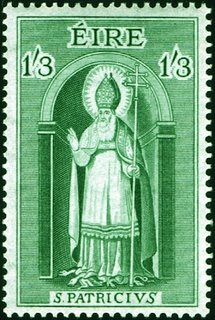St. Patrick

Don't say it too loudly -- especially not around my red-headed wife's family, all those Rays and Murphys and O'Connells and McFaddens and Donahues.
Shhh. The patron saint, nay, the symbol of Ireland . . . was a Romanized Brit.
This hardly matters to the revelers who consume thousands of gallons of beer (green-dyed and otherwise) in St. Patrick's Day celebrations -- any more than the fact that George Washington was a Brit has ever bothered any of the people who celebrate the 4th of July, or the fact that Cleopatra was a Greek has ever bothered a Hollywood casting director. Still, in the politically-charged days since the Elizabethan colonization of Ireland in 1556, it's better to whisper Patrick's ethnic origins if one is to mention them at all.
Patrick's father was a middle-class deacon and bureaucrat, which meant that Patrick could have expected to enjoy a decent education and livelihood; but at 16, Patrick was kidnapped by Irish pirates who attacked his father's farm in England, and he became enslaved for 6 years. During the near-starvation and other privations of his captivity, Patrick sustained himself with his faith in God, away from clerics or formal instruction.
At the end of 6 years, a mysterious voice told him that he was going home, whereupon he was either freed or he escaped from his captivity, walked 200 miles to the Irish coast, and hitched a boat back to England. There, after reuniting with his family, Patrick was visited by another divine messenger who revealed what was to become Patrick's calling: to bring Christianity back to the land of his captors, to become a civilizing voice among the Irish or vox hiberionacum.
He received rudimentary training for the priesthood (lacking a complete classical education, something which he would always regret) and returned to Ireland around 435, working principally from Armagh in the North. Although legends credit him with single-handedly converting the whole of Ireland (using the three leaves of the shamrock to explain the Trinity), in actuality his mission concerned itself with organizing his small flock into a church administration, and turning them upon the rural Irish to stamp out idolatry and sun-worship.
His two rough Latin works (a Confession, and an Epistle, in which he denounced the treatment of Irish captives by a Briton chieftain) are the earliest surviving Irish texts, revealing a humble man who was conscious of his status as an intellectual exile as well as a physical one. By a few hundred years after his death, he was credited with a number of tall miracles, including driving all of the snakes off of the island, and certainly the metaphoric significance of that tale has fueled much of the Irish nationalistic spirit with which he later became identified.
It doesn't explain the green beer, however.
Categories: Christian-History, Ireland
Labels: Christian History, Ireland





4 Comments:
I understand that driving the snakes from Ireland is also bunk or in kinder words, a fable.
Can you shed any light on this snake business!
Look all us Paddy's (at least the Irish ones) know that St. Patrick was Brit. It's not our fault you American's don't know these things.
>walked 200 miles to the Irish coast
Ireland at it's widest is only ~200miles.
Ok, time for a bad joke:
Why did Saint Patrick drive the snakes outta Eire?
Because their car broke down!
That's a cracker!
To anonymous #1: Unfortunately, neither St. Patrick nor the snakes are available for comment, but I will say that you won't find a serpentologist who can tell you about any snakes that are indigenous to Ireland.
To anonymous #2: All my sources still say he walked for 200 miles, which suggests to me that he wasn't walking as the crow flies. Question for you is, what did St. Patrick drive?
To be boring: There are no snakes in Ireland because the sea level rose at the end of the ice age before they managed to get there from continental Europe.
Re Romano-British - could, of course, mean he was a Celt - the Anglo-Saxons hadn't actually got their teeth into Britain and only joined the natives rather than driving them out (old victorian myth)- and there is the possibility that his family were old soldiers planted in the UK - so choose any part of the Roman Empire for ethnic original - now, how about North Africa? Ever thought of a Black St Patrick (there WAS a Black Roman emperor which few people know about!).
Post a Comment
Subscribe to Post Comments [Atom]
<< Home